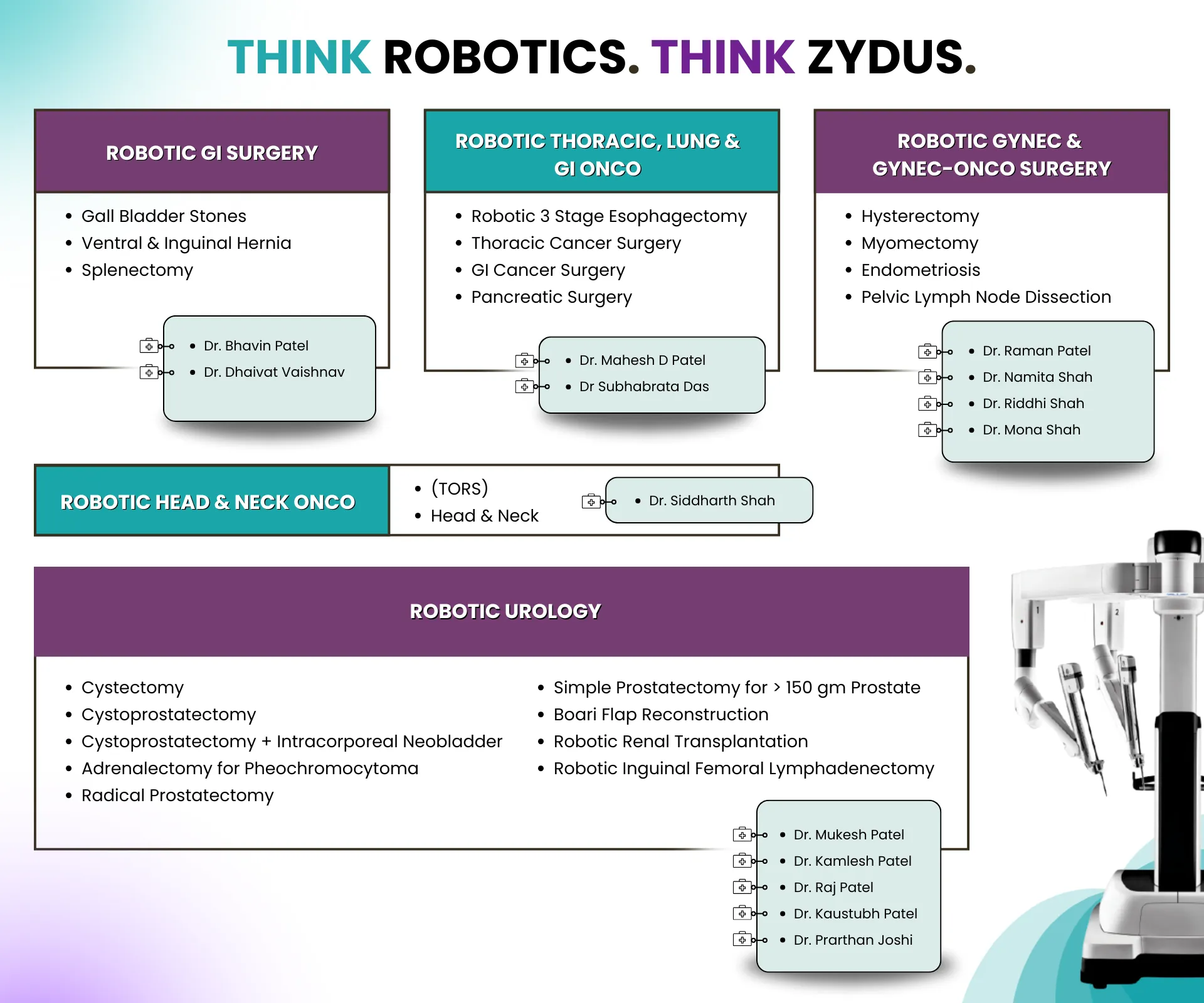
Nephrology And Urology
- Medical Specialities
- Nephrology & Urology
- Robotic Urology Surgery
ROBOTIC UROLOGY SURGERY
Urology is a branch of medicine that encompasses the medical and surgical management of diseases affecting the urinary tract and the male reproductive system. It also addresses conditions like renal cancer, prostate cancer, bladder and testicular cancer, and more.
With robotic surgery transforming urological care by offering patients a safer, less invasive alternative to traditional open and laparoscopic procedures and quicker recovery times, Zydus is at the forefront, enhancing precision and improving patients’ overall Quality of Life. Robotic-assisted techniques are now the preferred approach for many complex urological conditions, some of which include:
Radical Prostatectomy
Prostate cancer is one of the most common cancers in men. Radical prostatectomy involves the surgical removal of the entire prostate gland and some surrounding tissue to treat localised prostate cancer. The goal is to eradicate cancer while preserving urinary and sexual function. Robotic-assisted techniques enhance surgical dexterity and visualisation, potentially reducing complications.
Radical Cysto-Prostatectomy
For invasive bladder cancer, radical cystectomy is often required to remove the bladder and surrounding lymph nodes. In men, this procedure typically includes the removal of the prostate and seminal vesicles; in women, it may involve the removal of the uterus, ovaries, and part of the vagina. In some cases, additional urinary reconstruction is needed to restore function. Robotic-assisted surgery enhances the precision of these complex procedures, potentially leading to better oncological outcomes and faster recovery.
Intracorporeal Neobladder Reconstruction
For patients undergoing bladder removal or those with a dysfunctional bladder, a new bladder is constructed using a segment of the intestine, allowing for natural urine voiding. Robotic-assisted surgery improves precision in tissue handling and suturing while minimising complications such as leakage or infections.
Partial Nephrectomy
Partial nephrectomy, a nephron-sparing surgical procedure, involves removing a localised kidney tumour while preserving as much healthy tissue as possible. This approach is preferred for small renal masses to maintain optimal renal function.
Pyeloplasty
A blockage at the ureteropelvic junction (UPJ) can cause kidney swelling, pain, and long-term kidney damage. Here, the connection between the kidney and the ureter is narrowed, leading to impaired urine flow. Pyeloplasty is a surgical procedure that corrects UPJ obstruction by removing the narrowed segment and reconstructing the urinary tract to restore normal urine drainage. Robotic-assisted pyeloplasty enhances visualisation and dexterity, leading to potentially better patient outcomes.
Other Common Robotic Procedures at Zydus:
-
Adrenalectomy for Pheochromocytoma
-
Simple Prostatectomy for 150gm prostate
-
Uretic Re-implantation
-
Boari flap Reconstruction Renal Transplantation
-
Inguino Femoral Lymphadenectomy (VAIL)
Why Choose Robotic-Assisted Surgery?
Compared to traditional open and laparoscopic techniques, robotic-assisted surgery offers:
Minimally Invasive Approach
Smaller incisions result in less pain, minimal scarring, and shorter recovery times.
Enhanced Precision
Advanced robotic systems provide superior visualisation and greater dexterity, allowing for more accurate tumour removal and delicate suturing.
Reduced Blood Loss and Complications
The robotic approach significantly lowers the risk of excessive bleeding and infection.
Faster Recovery
Patients experience shorter hospital stays and a quicker return to normal activities.
Improved Functional Outcomes
Particularly in procedures like prostatectomy and neobladder reconstruction, robotic surgery helps improve the overall quality of life
10-Time magnification
Enhanced imaging allows for better accuracy.
Increased nerve and sphincter preservation
Minimises damage to nerves and muscles that control bowel movements (anal sphincter) and urinary function, improving post-op life.
Water-tied anastomosis

